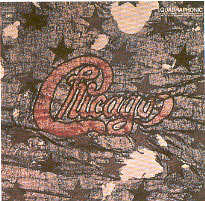 CHICAGO III CHICAGO III
Release Date: 1971
Cover Design: American Flag
Proves Cover Theory: NO
Becky Rating: IX out of X
THE OVERLOOKED ALBUM
This will seem like heresy to Chicago fans, but I prefer III to CTA or II. III is Chicago's most overlooked album, the one non-fans have forgotten completely, and the one fans tend to dismiss with 'Ah, yeah, another double album with some socially-conscious stuff and more songs about life as a traveling musician. Plus it didn't have any hits." No, it didn't. And yes, there are similarities with the last two albums. But I don't want to dwell on those here.
Instead, let's examine why III is different from the other two, beginning with the overall sense of brightness I find on this album. (Maybe because so many of the songs are pitched in sharp keys?) Take Lowdown, for example. Here's a song with depressing lyrics paired up with one of Chicago's happiest-sounding music tracks. Cetera sings in his range and plays some Phil Lesh-style lead bass. The instrumental break starts with a solo Terry Kath didn't care for, but then the horns, organ, and bass run through four keys in about 30 seconds - by the time of the last change you can't help but smile - and maybe be inspired positively to try and go out and change what's wrong with the country?
Then there's Hour in the Shower, the silly suite by Terry Kath which is notable at least by me as the only blatantly sexual lyrics Chicago ever recorded (unless you thought all that stuff about showers, maypoles, spam, and electric friends were about something else?). It's bright, happy music, and fun to play along with as well.
The last side of the second album (let's pause here and consider, Chicago essentially released six two-sided records in just two years) is given over to an instrumental suite preceded by a now-dated poem spoken by Robert Lamm. A few jazz and modern classical inspired pieces follow, but then we hit The Approaching Storm. Rather than sounding menacing, it just sounds - happy? Yeah, and it gives each of the soloists a chance to stretch out. Those folks at Carnegie Hall really knew what they were requesting. But more on that later.
This is Chicago in the '70s, so of course there are the requisite songs about social issues (Mother is about the environment, I Don't Want Your Money about class differences) and about the band's place in the music business (Sing a Mean Tune Kid shows them contemplating their own future as "super pop stars"). There are the Beatle influences (At the Sunrise), the Crosby Stills and Nash influences (Flight 602) and the classical influences (Canon and Free Country, in particular). There's the first Chicago song with a Latin influence in Happy 'Cause I'm Going Home.
And it's here where we begin to see that Peter Cetera's musical direction is far from the rest of the band. Just listen to What Else Can I Say and you'll hear the future, for better or worse.
So here we are, at a crossroads for Chicago. They have three albums behind them, and at this point are starting to get some major radio play. They've made their point of being a socially-conscious rock band with horns. They haven't peaked yet, but III shows they're definitely on the way.
(c) 2001 Becky Banfield for Dos Gardenias Productions
Back to Chicago Album Review Index
Back to Chicago Homepage
Back to Music
Happy Cause I'm Going Home
|